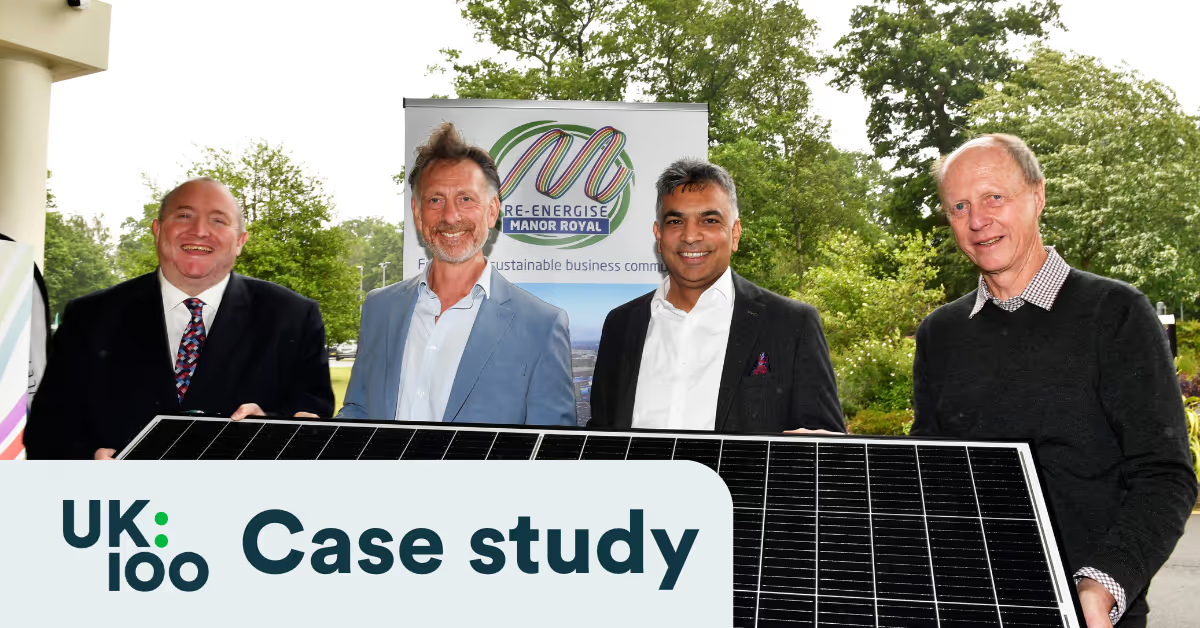MPs back UK100 proposals in Green Finance Report
Recommendations in the report by the Environmental Audit Committee.

.svg)
People like investing in places and people they know. This truth, somewhat overlooked in much discussion about the barriers to investment that will help us stop catastrophic climate change, underpins some important recommendations in the report by the Environmental Audit Committee into Green Finance.
While exploring the recent stalling in clean energy investment, the committee identifies a number of specific proposals that can help unlock the green finance that so many insist is available but is not flowing. And investment in place and in communities features strongly. Why? Because the transformation of our energy system can’t simply be done by “grand projets” of the old school. Instead local, integrated projects that bring together a range of proven technologies in one place are key to a successful transition to a fossil fuel free economy.
Successful and resilient energy systems in the future will be decentralised for a couple of reasons. Heat and transport will necessarily be decarbonised locally. Moving around and heating buildings happen in a specific place: national standards and policies will make this possible, but local decisions will deliver. Furthermore as more electricity is generated locally (by wind, sun, tidal or hydro) it will be closer to where it is used. Electric vehicles won’t just consume power but can store it too. Storage will enable renewable generation to be used when it is needed not just when it is generated, and smart systems will enable consumers to be savvier about when and how they use energy too.
But big investors like a big project: it is no surprise that offshore wind and solar farms have taken off as costs have dropped. They are only part of the picture however and unless and until local integrated clean projects are at scale and de-risked there are still barriers to success.
UK100, the network of UK cities committed to 100% clean energy by 2050 has skin in this game. The local leaders that make up our network want to be able to transform their communities into ones that not only are protected from the unavoidable impacts of irreversible climate change but also develop the jobs, skills and industries that clean energy offers. Our Report “Financing the Transition” is echoed by the Committee in its recommendations to build capacity in local government and the need for development capital for projects to be “investor-ready”.
Local Authorities are well-placed to lead on the cleanup of our energy system: they have policy levers in a number of sectors which need new cleaner and smarter forms of energy, from social housing and building standards, to public transport, licensing, regeneration and planning.
UK100 has good examples of the kind of innovation that is needed. Nottingham is one of our leading members, developing subsidy-free community energy in private housing developments (Project ScEne), as well as energy efficiency projects that pay for themselves and tackle fuel poverty in low-income neighbourhoods (the EnergieSprong model). Peterborough made the most of Feed-In Tariffs to supply solar panels to residents and generates income to protect frontline services: a key driver of innovation as local government finances continue to be tight. Leeds Hydrogen project has the ambition to decarbonize heat in the city.
Many of the ideas that local authorities are developing are based on proven technologies, but are seeking scale and the right business model in order to attract investment. The innovation that is required is in finance, not technology. This is less a challenge for engineers now, and more for developers and investors.
The Report by the EAC outlines a number of changes that have happened recently that might be behind the stalling of clean energy investment, from the premature end of the Renewables Obligation, the reduced Feed-In Tariffs, to the cancelled the Zero Carbon Homes policy and cancelled the £1 billion Carbon Capture & Storage competition.
The possible end to access to the European Investment Bank as a result of Brexit might make some of these projects less likely in the future. A similar kind of facility, designed to enable our nation to meet its legal obligations under the Climate Change Act and its commitments at Paris is essential, if access is withdrawn.
Imagine if there was a set of technologies and infrastructure that, if invested in, would kick start our sluggish economy and create greater resilience in our energy system? That would keep costs to consumers low and would help us tackle some of our biggest public health crises? Those are the technologies and projects that need to be developed, at scale, with residents’ and businesses’ needs at their heart : local leaders are keen to meet that challenge – it is welcome that MPs recognize this ambition. Now it is for government to respond with an active industrial strategy and more innovative financial models that could make 100% clean energy a reality in the UK.
.svg)


.png)




